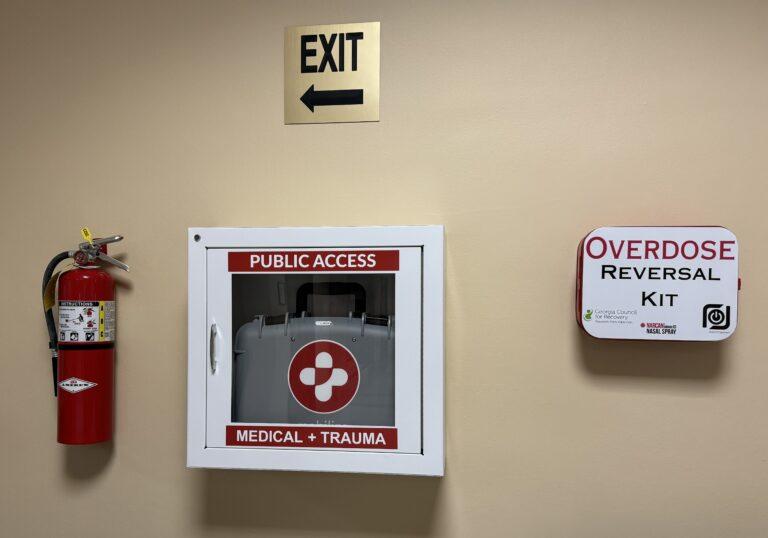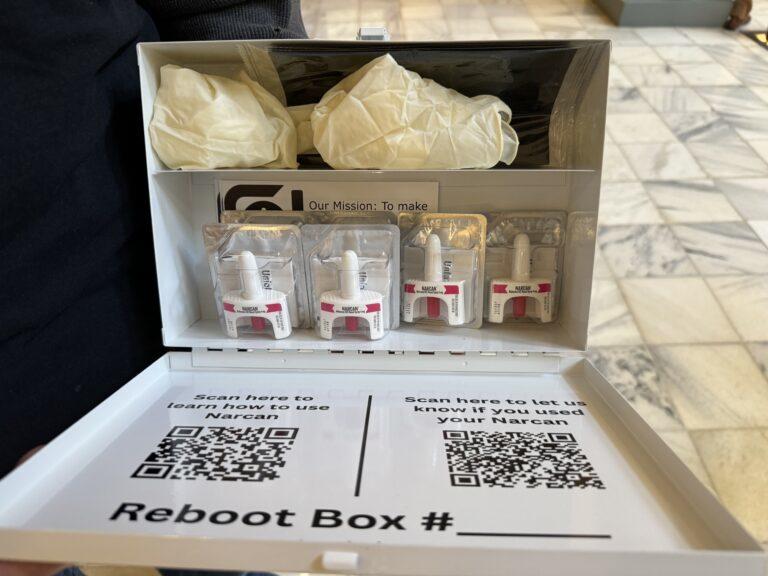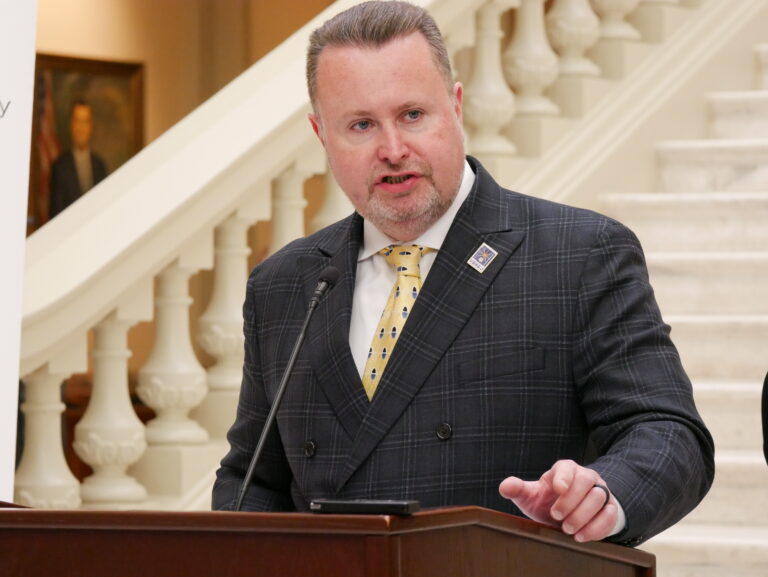
Caption
An overdose reversal kit was installed next to emergency medical equipment and a fire extinguisher near the main public entrance at the state Capitol. It’s one of five on site.
Credit: Jill Nolin / Georgia Recorder
Jon Langston says he probably would not have set foot inside the state Capitol before he sobered up 15 years ago. But if he had visited, he would have most definitely been high.
So to him, the five overdose reversal kits that were installed under the Gold Dome last year are more than symbolic.

An overdose reversal kit was installed next to emergency medical equipment and a fire extinguisher near the main public entrance at the state Capitol. It’s one of five on site.
But as a person in long-term recovery who now advocates for more widespread adoption of naloxone kits, Langston said he also sees the prominent placement of the boxes as an important recognition.
“I don’t much think there will be an overdose at the Capitol. I just really don’t. There may be,” said Langston, who is president and founder of Reboot Jackson, which is a recovery community organization in Jackson County.
“But that symbolism for the state Capitol to say hey we see the need and we have these in our Capitol — yeah, that’s huge,” he said.
Georgia officials have been taking steps over the last decade to ease access to the life-saving drug in response to the rise in opioid overdoses here and nationally. The state has, for example, made the drug available over the counter and empowered first responders to carry it.
Langston said he sees mandating access in government buildings, including schools and universities, as the “next bite” towards broader access. As an advocate, he pointed to Honolulu’s recent decision to require bars, nightclubs and restaurants to have the anti-overdose medicine on hand as his ultimate goal for Georgia.
“Overdoses are real and so is recovery, but they can’t recover if they’re dead,” he said.
A bill has not yet been filed but the proposal is one of a few legislative initiatives announced Thursday as priorities of the Georgia Council for Recovery, formerly known as the Georgia Council on Substance Abuse.
“This saves lives. This breaks stigma,” said Jeff Breedlove, who is the council’s advocacy strategist.
Breedlove cited the Georgia World Congress Center as being a state-owned complex where the overdose reversal drug is sorely missing. The sprawling center is the setting of many large events, including what is billed as the country’s largest event focused on the opioid crisis, the Rx and Illicit Drug Summit.
Conferees checking in might notice a defibrillator and a fire extinguisher on site, but they won’t see a naloxone kit.
“There’s nothing for us,” Breedlove said. “We just want the state to be prepared.”
The council also backed two other proposals for this session, although only one of them has been filed. A Senate bill that was filed late in the session last year by Cataula Republican Sen. Randy Robertson would create a certification process and regulations for recovery residence programs, which is often the next stop after treatment.

This naloxone kit has six Narcan doses and multiple pairs of gloves and masks. Five kits like this have been installed at the state Capitol and other buildings.
Todd Wilson, who is executive director of the Georgia Association of Recovery Residences, said his group represents more than 100 locations in the state, which offer more than 4,000 bed spaces for people healing from addiction.
“We’re ground zero to the recovery of many people,” he said.
But Wilson said Georgia lacks the regulatory framework to protect these vulnerable people and help them succeed in their recovery. State standards are needed to ensure these recovery residences are run safely and ethically, he said.
“Currently in the state of Georgia, you have to have a license to cut hair, but you do not have to have a license to run a recovery residence,” Wilson said.
Another proposal would define in state code what a recovery community organization is. Breedlove said the goal is to guard against any unscrupulous group that might try to exploit people who are in recovery.
A series of meetings will be held across the state as Georgia prepares to divvy up the $636 million received through the opioid settlement for treatment and prevention.
Kevin Tanner, commissioner of the state Department of Behavioral Health and Developmental Disabilities, said Thursday that more information about the meetings will be announced in the spring.

Kevin Tanner, commissioner of the state Department of Behavioral Health and Developmental Disabilities, speaks at Addiction Recovery Awareness Day in 2024.
Tanner, who is the trustee of the funds, pledged transparency as the state sets up an application process for grants. The commissioner said his agency is doing an inventory of resources that are available in Georgia.
“We’re going to be overly transparent with that process, and we’re going to communicate with you the peers and others around this state,” he said to a group of people gathered at the Capitol Thursday for Addiction Recovery Awareness Day.
The money is Georgia’s share of a $26 billion multistate opioid settlement with Cardinal, McKesson, and AmerisourceBergen — the nation’s three major pharmaceutical distributors — and opioid manufacturer and marketer Johnson & Johnson.
This story comes to GPB through a reporting partnership with Georgia Recorder.